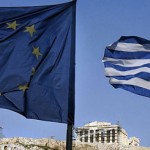Signs the market is girding for a Greek default

If the financial market is a good predictor, you’d better brace for a Greek default.
Borrowing costs on Greece’s government bonds have rallied back to levels not seen since 2012, the cost of insuring against a default has surged and investors are moving into safer assets in the eurozone, such as German bonds and equities.
These factors all indicate that capital markets are getting increasingly concerned the Greek government won’t reach a deal with its lenders in time to avoid a cash crunch. If the country runs out of money it could face a default and eventually be forced to leave the eurozone. Read: S&P cuts Greece credit rating, outlook is ‘negative’
“Overall the probability of a Greek exit is higher now than it ever was,” analysts at Barclays said in a note last week. “Even if a no-default ‘muddle-through’ remains our baseline forecast for now.”
The concern was echoed at Nomura, where economists said the “loss of trust in Athens among Greece’s eurozone partners has significantly raised the probability of […] a ‘Greccident’.”
The bank put a 40% probability of a Greek exit and “this is still rising with no clear sign of a reversal”.
There is one thing to bear in mind. A default doesn’t necessarily equal an exit from the eurozone. In 2012, Greece defaulted on some of its debt and went through the biggest debt-restructuring in history, but it didn’t push the country out of the currency union.
In any case, financial markets fear something bad is about to happen to Greece, as illustrated over the next four charts.
Bond dump
The heightened risk of a potential Greek default is mainly being felt in the bond market. Particularly the three-year paper is getting creamed, with the yield surging above 27% over the past week, the highest since being issued. On Monday, it traded with a yield of 26.98%.
“The three-year Greek yield is most sensitive to the latest fears that Greece won’t be able to pay back its debts,” said Kathleen Brooks, research director at FOREX.com, in a note from last week. “[It’s] under the most pressure as it corresponds with the maturity of Greek bailout funds.”
Other maturities also have had a rough ride, with the benchmark 10-year yield jumping almost a percentage point to 12.8% on Monday, the highest in over two years. However, it is still a far cry from the +40% yields Greece dealt with in March 2012.
Spiking insurance costs
The cost of insuring Greek debt against a default has also spiked sharply amid the negotiation standoff. Prices for credit default swaps, known as CDS, imply a 77% probability of a government default in the next five years, according to data from Markit, released last week
A CDS gives investors protection against a debt default and the higher the insurance price, the greater fear there is in the market that it could actually happen. Insurance payouts on Greek bonds were triggered after the default in 2012.
However, the cost of insuring against a Greek default is notable smaller than three years ago. Kathleen Brooks pointed to a couple of reasons for that. 1) There are fewer investors that actually hold Greek bonds, so fewer people to take out insurance. 2) Some investors presume the European authorities will make sure it is a “managed default” where creditors get all their money back, thus no CDS payout.
Contagion
During the 2012 Greek debt crisis, borrowing costs surged in other financially stressed eurozone countries such as Spain, Italy and Portugal on concerns the financial woes would spread to the rest of the eurozone. However, a lot of things have happened since then: eurozone banks have significantly decreased exposure to Greece, the European Central Bank has put several rescue buffers in place and the overall economic outlook in Europe is much stronger. Read: ECB’s Draghi rejects talk of Greek exit
As the chart shows, bonds in, for example, Portugal are largely unfazed by the debacle in Athens and it is the same story across most of the eurozone.
Barclays warns, however, not to entirely dismiss the potential fallout from a default or so-called Grexit.
“A Greek exit would certainly set a precedent, changing the fundamental nature of the monetary union to one in which ‘exiting’ would become a distinct possibility,” Barclays analysts said in a note.
Greek finance minister Yanis Varoufakis has also warned that if Greece leaves the eurozone, others could follow.
Safehaven search
With investors dumping Greek assets, they are looking for somewhere else to store their cash. To many, the answer is heading for havens, such as German government bonds, which currently are yielding next to nothing and for many maturities actually are in negative.
This “may continue to push investors into riskier assets in the coming weeks,” according to FOREX.com’s Brooks. She notes that European stocks, including Germany’s DAX 30 index DAX, +1.74% “could be the beneficiary.”
The German benchmark is currently trading close to record highs, but it should continue to outperform its U.S. counterparts, she said. This is mainly due to a boost from the ECB’s aggressive 1.1 trillion-euro ($1.18 trillion) quantitative-easing program and an expected Federal Reserve rate hike later this year, which could put a break on rising share prices in the U.S.
And if those signs don’t move you, U.K. bookmaker William Hill has suspended bets on a Greek exit from the eurozone.
Source: Marketwatch – Signs the market is girding for a Greek default




























